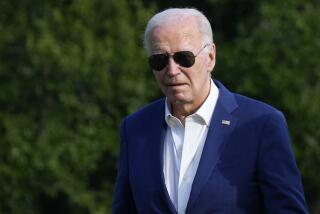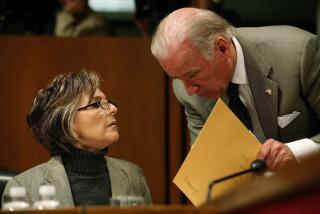NEWS ANALYSIS : Ghosts of Past Again Haunt Clinton, Perot
It looks like deja vu all over again for Ross Perot and Arkansas Gov. Bill Clinton. Both head into the presidential election’s last week struggling against old problems that have suddenly acquired new force.
Clinton’s lead remains substantial in almost all polls--largely because President Bush’s support remains frozen at about one-third of the electorate. But Perot’s surge--and his flurry of incendiary accusations against the White House--have added a blaring note of uncertainty to a campaign that had settled into a familiar routine since Labor Day.
After a rapid ascent following his strong performance in the three presidential debates, Perot has plunged his campaign back into turbulent waters. On Monday, he held a bristling session with reporters where he again said that he quit the race last summer because informants told him the GOP planned a smear campaign against his daughter.
Since he re-entered the race, questions about Perot’s character have been muted. But his charges against the GOP--which he admitted he has no evidence to support--have put back on the radar screen concerns about his stability and his penchant for conspiracy theories.
With his charges, Perot provoked a reprise of last summer’s longest-running soap opera, the war of words between the White House and the Texas billionaire. It sounded strangely like last June on Monday, when White House Press Secretary Marlin Fitzwater described Perot as a “paranoid . . . who has delusions.”
“Those were big problems that Perot made a lot of progress against after the debates,” said Andy Kohut, who conducts polls for the Times Mirror Center for the People and the Press. “But because of this bizarre stuff that happened Sunday and Monday, he may have fallen back a lot.”
Largely because of Perot, Clinton also finds himself confronting familiar dilemmas in the campaign’s final days.
During the Democratic primaries last spring, Clinton faced his greatest political problems when a combination of assaults on his veracity and unflattering comparisons to political outsiders--first Paul E. Tsongas, later Edmund G. (Jerry) Brown Jr.--led many voters to dismiss the Arkansas governor as a typical double-talking politician.
At the Democratic Convention in July, Clinton recast himself as a small-town product of the American Dream. But now he appears to be suffering from the same unfavorable comparison that plagued him during the primaries--with Perot playing the role that Tsongas and Brown once did.
“It’s the Tsongas problem all over again,” lamented one senior official in the Clinton campaign.
Clinton’s problem, many observers say, is one of contrast. “When Clinton is put up against the likes of Paul Tsongas or Jerry Brown or Ross Perot, people tend to see his flaws as a politician,” said Democratic media consultant Joe Trippi. “Up against George Bush one on one, Bush is the one who is seen as flawed and Clinton is the fresh outsider. But Perot made Clinton look a lot more like George Bush.”
Combined with Bush’s persistent attacks on Clinton’s character, Perot’s challenge for the mantle of change has taken a toll on the Democrat’s public image.
Polls show that the percentage of voters with a negative opinion of Clinton has increased since early October. In a Times Mirror survey released Sunday, 44% of those polled now say that of the three candidates, Clinton is best described by the phrase “a typical politician.” That’s up 10 percentage points since early October. Likewise, 37% of those surveyed now doubt his trustworthiness--an 11-point increase.
Much of this may be explained by Bush’s sustained attacks on Clinton’s character. And Clinton’s slippage in the polls over the past week may also reflect a natural collective shudder--a kind of national catching of the breath--before turning over the White House to a man most Americans knew nothing about just one year ago.
But some observers blame at least part of Clinton’s problem on his own cautious strategy since Labor Day.
His earlier message of “personal responsibility” and “reinventing government” through reforms in the delivery of social services has virtually disappeared. That has been replaced by a streamlined attack on Bush’s economic record and a metronomic, if often vague, exhortation for “change.”
In the debates, Clinton carried that approach to an extreme. Confident of his large lead over Bush, aides say, Clinton entered the three debates this month intent on reassuring voters, rather than laying out a detailed agenda.
Clinton never used the term “personal responsibility” in the debates, nor did he mention such departures from traditional Democratic thought as his proposals to impose a two-year time limit on welfare or to cut federal employment by 100,000.
“Given the lead they had, it didn’t appear they were willing to take many risks in the debates, and that careful approach made him look more like a (conventional) politician,” Trippi said.
Clinton appears keenly aware of this dynamic. In campaign appearances since the debates, he has intensified his call for reform in both Washington and the Democratic Party, and even appropriated some of Perot’s anti-politician language.
But he did little of that when he had an audience of 90 million people during the debates. That caution created an opening for Perot--who took advantage of it.
Much as George C. Wallace disparaged his opponents by declaring there wasn’t a dime’s worth of difference between the parties, Perot has advanced by dismissing both of his rivals as typical politicians defending the status quo.
But the tumult over charges of GOP dirty tricks Perot set in motion Sunday now threatens to obscure the Texan’s refurbished identity as a reformer--and restore the “Inspector Perot” image that dimmed his prospects last summer. “Third-party candidates are a risky proposition (to begin with),” said Kohut, “and when they do crazy things, they get punished by the voters.”
Even before this blowup, operatives in both parties say that polls conducted over the weekend suggest that Perot’s post-debate wave had crested.
But Trippi believes that the wave of discontent propelling Perot may be strong enough to sustain him at a level higher than most believe. “This may stop him from going up to 25% or 28%, but people want to tell these guys in Washington they are ticked off so badly that this won’t break his base,” Trippi predicted.
Here’s another point worth remembering: No other candidate facing a storm of controversy like Perot has ever had the capacity to spend $25 million in a week on television ads to repair the damage.
More to Read
Get the L.A. Times Politics newsletter
Deeply reported insights into legislation, politics and policy from Sacramento, Washington and beyond. In your inbox three times per week.
You may occasionally receive promotional content from the Los Angeles Times.










